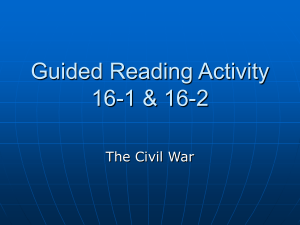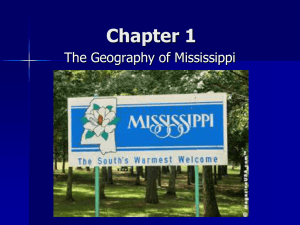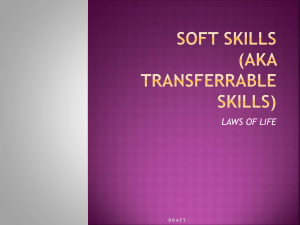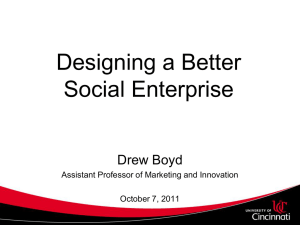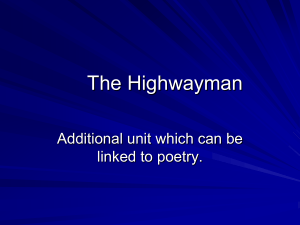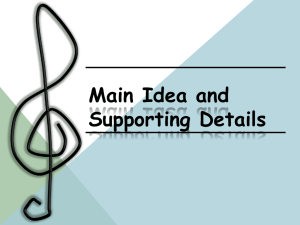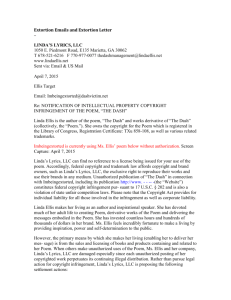Mississippi Trial
advertisement
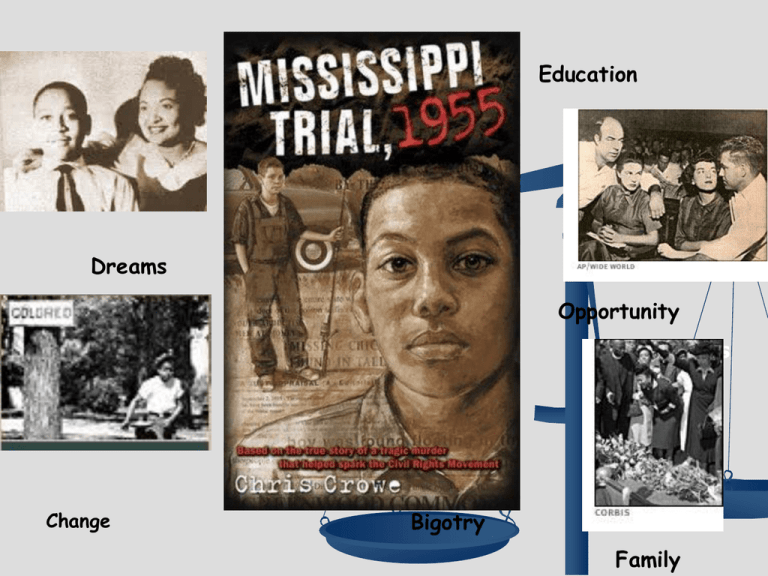
Education Freedom Hope Dreams Opportunity Decisions Traditions Change Bigotry Family Based on the cover illustration and title of the book Mississippi Trial, 1955 jot down some predictions on what you think this novel will be about. As part of a KWL, please use the Drawing Program in Word to draw and create a collage of all that you KNOW about the Civil Rights movement. You will use this drawing as a Sketch to Stretch to share with a partner in class. That is, show your partner your illustrations and have him or her respond to it BEFORE you say anything. Think about if what you created communicated your intentions. THEN discuss your illustrated K explaining your intentions. Now before reading jot down questions you have about the Civil Rights Movement Under the W column of the KWL chart for what you WANT to know. In Mississippi Trial Jim Crow Laws were in place. Please visit Remembering Jim Crow to learn more about these “laws” and their impact on African Americans in the South. Explore links, read, view and listen to interview excerpts. What do you suspect the setting will be like in this book? Please keep an RRJ for this site. Please read Chapters 1 to 14. While you read please highlight Golden Lines, lines or phrases that strike you as particularly meaningful, evocative or powerful. During the literature circle discuss your response to the book in an open ended way sharing some of your Golden Lines as relevant to your conversation. Chapters 1-14 Discuss the events in an open ended way during literature circles. In your group, with a partner or individually go back into the book to create a poem for two to three voices in which characters alternately speak to each other and/or say the same or different lines simultaneously. It is helpful to format your poem into columns- one column for each speaker. When characters speak simultaneously the lines appear at the same level. See example of possible format below. GRANDPA DAD 1 2 3 4 5 Simultaneously spoken 5 Chapters 1-14 Rosa Parks is considered to be the Mother of the Modern Civil Rights Movement. Link onto Rosa Parks: How I fought for Civil Rights and explore each of the seven links to learn about the times in which Mississippi Trial takes place. Please jot down your thinking about this site in your RRJ Chapter 14 to end Please read Chapters 14 to the end. While you read focus on the voice of a particular characters- i.e. select Hiram, Grandpa, RC, Naomi, father and highlight interesting conversations. Bring this focus to your literature circle and share aspects of characters as relevant to the conversation. Chapter 14 to end In your Group, Partner or individually select a character or author on which to focus. Brainstorm five burning questions you have for that character and select your top two questions. Speculate about how that character might respond to your questions and why. Use evidence from the text and your background knowledge. Now read about Chris Crowe to find out more about Mississippi Trial at http://www.penguinputnam.com/static/packa ges/us/yreaders-new/f15-start.html Keep a RRJ for this site. Visit the American Experience Website entitled the Murder of Emmett Till and explore links to learn more about the events in Mississippi Trial. Please complete an RRJ for this website. Complete the what you LEARNED part of your KWL on Civil Rights and then indicate what you still would like to learn. ADD Links to Music Sample of audio of Billie Holliday’s Strange Fruit http://www.pbs.org/jazz/biography/artist_id_holiday_billie.htm Lyrics to Strange Fruit at http://www.bluesforpeace.com/lyrics/strange-fruit.htm Lyrics to Bob Dylan’s The Death of Emmett Till at http://bobdylan.com/songs/emmetttill.html Lyrics to We Shall Overcome at http://www.negrospirituals.com/news-song/we_shall_overcome.htm Read the lyrics as an inspiration to create your own song or multimedia poem in response to Mississippi Trial to share with class. Advanced Adequate Needs Improvement Building and Activating Background Knowledge Tapped into what was known and presented it in way that was comprehensible to others Predictions drew on clues from illustrations and background knowledge Tapped into what was known but work needed revision and explanation to be comprehensible. Predictions drew solely on clues from the text, little use of inferring Sketchy and vague representation, little detail, or concrete with very little care or depth in thinking. May be difficult for others to understand. Predictions drew on clues from text with very little use of inferring Reading and Responding Engaged in a focused on task discussion in which participants came prepared, made connections, built on the ideas of others and discussed fat questions Participants were prepared, and on task, but discussion did not flow smoothly, some fat questions were addressed. Some participants were not prepared. At times the conversation went off task. Ideas discussed for the most part were superficial. Thinking more Deeply and Revisiting the text Revisited text through poetry and drama by making inferences using information in the text and background knowledge. Revisited draft of poem. On balance participants were invested and drew on the text and background knowledge. The focus at times was on completion of the task with very little revision. Very little thought and care went into the poetry and dramatic activity. Task completion was the primary focus. Going Beyond the Text Demonstrated learning by integrating what was learned from experiences and websites in the L portion of the KWL Went somewhat beyond the text to demonstrate new learning. Drew on some information beyond the text. Did not think deeply or integrate new learning. Was not able to draw on websites and experiences to construct new ideas. Completing Assigned Tasks Completed all of the tasks with care. On balance completed most tasks with care Omitted several tasks or were very cursory attempts
